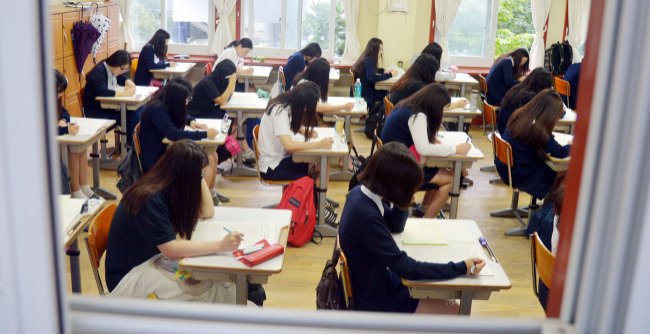South Korea’s rankings in the 2015 international student assessment slightly slipped compared to three years ago, though it still remains among the top eight the Organization for Economic Cooperation and Development members, the OECD report showed Tuesday.
The OECD announced the results of its 2015 Program for International Student Assessment (PISA), which surveyed about 540,000 15-year-olds in 72 different countries, including 35 member nations of the OECD.
South Korea ranked “first-fourth” in math by earning 517 points, “third-eighth” in reading with 524 points and “fifth-eighth” in science with 516 points among the OECD member states.
Including non-OECD members such as Singapore, Hong Kong and China, South Korea’s rankings dropped further. South Korea stood at “fourth-ninth” in reading, “sixth-ninth” in math and “ninth-14th” in science.
The PISA results are described in scopes such as “first-fourth” and “third-eighth” to present upper and lower bound estimates of each country when the score differences are not significant.
In the 2012 PISA result, the OECD ranked South Korea at the top in math with 554 points, put it first or second place in literacy with 536 points and between second and fourth in science with 538 points among its member countries.
The OECD announced the results of its 2015 Program for International Student Assessment (PISA), which surveyed about 540,000 15-year-olds in 72 different countries, including 35 member nations of the OECD.
South Korea ranked “first-fourth” in math by earning 517 points, “third-eighth” in reading with 524 points and “fifth-eighth” in science with 516 points among the OECD member states.
Including non-OECD members such as Singapore, Hong Kong and China, South Korea’s rankings dropped further. South Korea stood at “fourth-ninth” in reading, “sixth-ninth” in math and “ninth-14th” in science.
The PISA results are described in scopes such as “first-fourth” and “third-eighth” to present upper and lower bound estimates of each country when the score differences are not significant.
In the 2012 PISA result, the OECD ranked South Korea at the top in math with 554 points, put it first or second place in literacy with 536 points and between second and fourth in science with 538 points among its member countries.

Despite the fall in the PISA results, South Korean students showed stronger academic ability in every subject than the OECD average. The average of the OECD in the 2015 PISA results was 493 points in reading, 490 in math and 493 in science.
PISA is an international assessment that evaluates 15-year-old students on their proficiency in science, reading and math every three years since 2000.
In South Korea, 5,749 students attending 145 high schools and 23 middle schools took part in the program.
By gender, South Korean girls outshone boys in every subject.
The proportion of students showing poor performance increased in every subject last year, from 7.6 percent to 13.6 percent in reading, from 9.1 percent to 15.4 percent in math and from 6.7 percent to 14.4 percent in science, compared to 2012.
The survey found that South Korean students are slightly more motivated to study science and interested in the subject in 2015 than in 2012, though they are less enthusiastic about their study than the OECD average.
“As the PISA results showed a fall in academic ability, the state and provincial education offices should improve the system to support those lacking basic academic skills,” said the Education Ministry. “As Korean students lack an interest in science compared to the OECD average, there needs to policy efforts to make courses more fun and interesting.”
By Ock Hyun-ju (laeticia.ock@heraldcorp.com)
PISA is an international assessment that evaluates 15-year-old students on their proficiency in science, reading and math every three years since 2000.
In South Korea, 5,749 students attending 145 high schools and 23 middle schools took part in the program.
By gender, South Korean girls outshone boys in every subject.
The proportion of students showing poor performance increased in every subject last year, from 7.6 percent to 13.6 percent in reading, from 9.1 percent to 15.4 percent in math and from 6.7 percent to 14.4 percent in science, compared to 2012.
The survey found that South Korean students are slightly more motivated to study science and interested in the subject in 2015 than in 2012, though they are less enthusiastic about their study than the OECD average.
“As the PISA results showed a fall in academic ability, the state and provincial education offices should improve the system to support those lacking basic academic skills,” said the Education Ministry. “As Korean students lack an interest in science compared to the OECD average, there needs to policy efforts to make courses more fun and interesting.”
By Ock Hyun-ju (laeticia.ock@heraldcorp.com)
-
Articles by Ock Hyun-ju



















